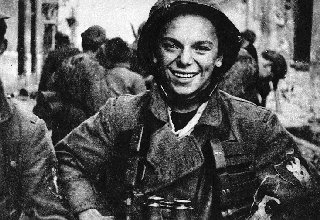PolScapes

IMPRESSIONS
| 
| REMINISCENCES
|

Nacisnij ponizej dla polskiej wersji opowiadania
KRÓL SZCZURÓW

IMPRESSIONS
| 
| REMINISCENCES
|

Nacisnij ponizej dla polskiej wersji opowiadania
KRÓL SZCZURÓW
On the first of August, 1944, I was eight
years old. It was during the World War II, and I was in Warsaw, Poland,
then under German occupation. It was a sunny afternoon. Crouching, I played
in a puddle after a short rain. I heard a sound not unlike that of nails
being hammered and got up. I saw an elegant man shooting off his rifle.
The end of the barrel was odd looking, like a funnel, and from it, flames
shoot out. He stood next to the neighboring house fence, slender and tall.
He wore khaki knickers, and on his arm, his right I think, was a white
and red armband. I didn’t have a chance to see anything more, for right
there my mother ran up and took me into the cellar of the condominium in
which we lived. In the basement stood primitive benches saved by the janitor
from the siege of Warsaw at the beginning of the war in 1939, upon which
our neighbors already sat. They were saying that the uprising was beginning,
that Warsaw would be freed by the resistance fighters, that the Germans
would flee, and that then the Bolsheviks would come, bringing the Red Army.
About the Red Army I had heard half
a year earlier, in the winter, while I was playing with my lead soldiers.
Andy, who was two year older, told me then, that it was called that because
all the soldiers wore red uniforms. I didn’t believe him: the lead soldiers
I had wore green uniforms and brown boots. The SS men in nearby barracks
wore black. Soldiers in red had to have red boots also, and no respective
soldier would wear such boots. Therefore, Andy was trying to trick me.
When I told him so, he pinched my nose painfully. But now, adults were
talking of the Red Army. They said that when it came, “what’s yours will
be mine.” What’s more, they reasoned that the Red Army marched without
shoes. This solved my problem. In red uniforms, but barefoot - that was
believable.
My mother was very upset: she murmured to
herself under her breath. At that time, this wasn’t common for her. I heard,
“ It’s crazy, stupid; they’ll destroy the city, everyone will die...”
I wasn’t sure just what was “stupid,” but
I didn’t feel it safe to ask. I imprinted the vision of the tall man in
my memory, and I was sure I’d never forget him. I knew that every shot
from his rifle was purposeful, and I wanted to go see him triumphant, but
with my mother I wasn’t going to have that chance. She was in a bad mood,
and one could easily get it.
I never saw that elegant man again. The next
day, another man, also a resistance fighter, came to the basement, wearing
the tell-tale white-red band on his arm. He was shorter, and not as stately.
He brought two carrots per each child and told us that Warsaw was almost
free, and that walking on the streets was unsafe, for the time being. He
said that because of this, we should dig a passage from our basement to
the basement of our neighbors. I thought this was a great idea.
A day or two later, my mother decided that
since she felt there was less shooting, we could move back into our house,
but only into the kitchen, since it was hidden from view. Once, when we
were sitting in the kitchen , an old friend, Romek Hartman, came by, and
it turned out that he, too, was a resistance fighter. He wore a thick,
wide belt, and pinned to that belt was a grenade. My mother was very puzzled
by the fact that Romek was a resistance fighter, because he was barely
three years older than my elder brother Maciek, and he was only twelve.
I asked him if he had a revolver, because I wanted him to show it to me,
but he told me that the only way to get a gun was off a dead enemy. He
added that in a matter of days he was to get a second grenade, but that
he couldn’t let me hold the one he had , because regulations forbid it.
My mother got upset again. At that point, it was very easy to upset my
mother, so it was worthwhile to watch out.




| 
| 
|
| [Previous] | [PolScapes Home] | [Next] |